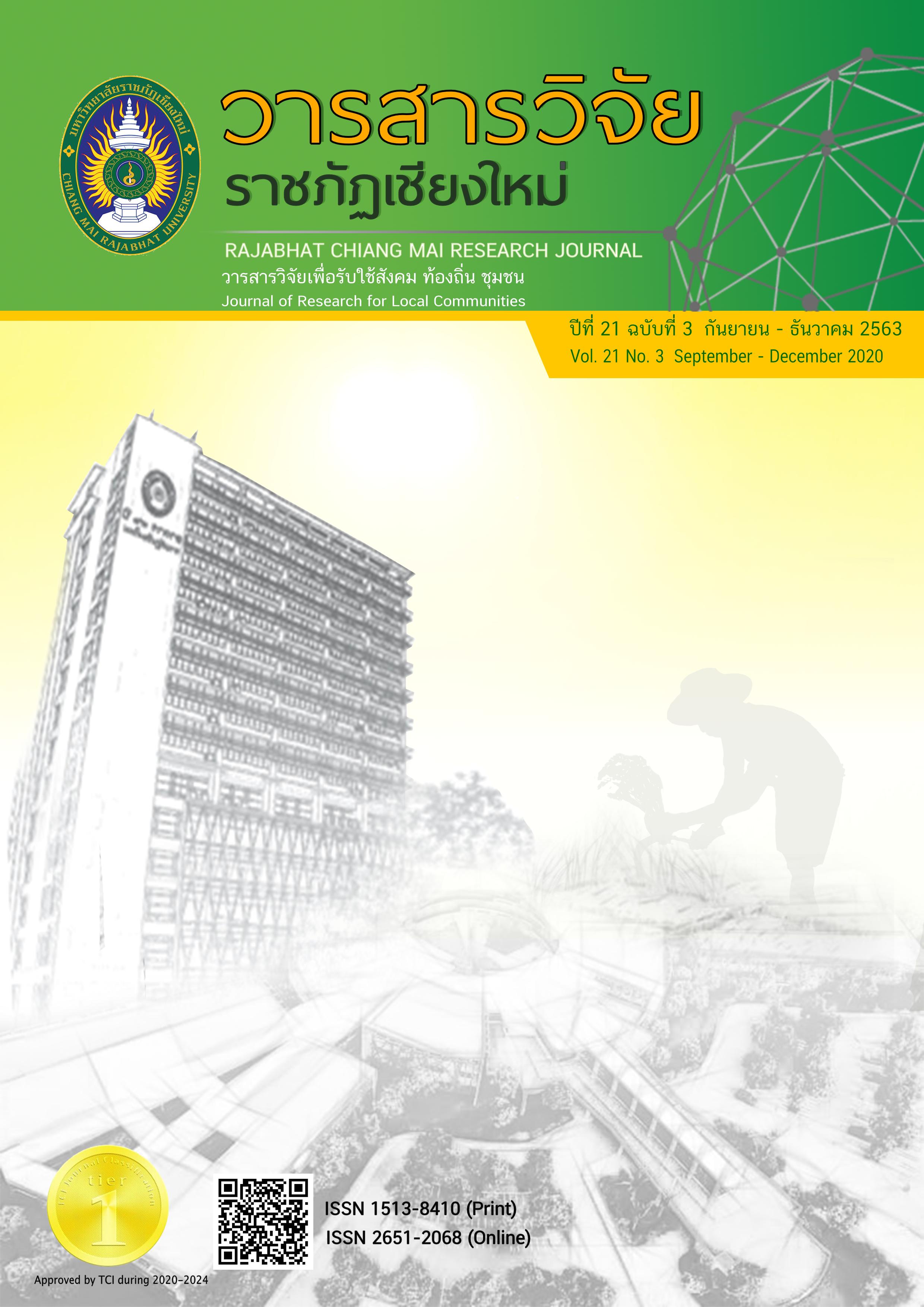The Building For Pga K’ Nyau Youth Leadership in order to Develop the Qualities of Life Under the Local Context (Self-Reliance) in Mae Na Chang Sub District Mae La Noi District Mae Hong Son Province
DOI:
https://doi.org/10.14456/rcmrj.2020.241701Keywords:
Leadership, PGA K’ NYAU, Quality of life, Local contextAbstract
The purposes of this research were to study approaches for building youth leadership of PGA K’ NYAU young people able to develop the quality of life in their local context in accordance with self-reliance, and to enhance the youth leadership of PGA K’ NYAU community in Mae Na Change sub-district, Mae La Noi district, Mae Hong Son province. As a tool for evaluation, participatory action research (PAR) was used. The sample group consisted of 30 PGA K’ NYAU young people. The techniques of in-depth interviews, Appreciation influence control (A-I-C), and project assessment model were employed as the research instrument. Qualitative data analysis was verified by content analysis and the quantitative data were analyzed by mean and standard deviation.
The findings were as follows: 1) the application of leadership theories should maintain a focus on core practices of weaving skills, distributing marketing channels, promoting of Karen’s OTOP fabric weave products, and providing the knowledge of household bookkeeping in response to the quality of life development in their local context. 2) After the development of leadership skills and capacities, they were able to set up plans, provide information, give support, control, and assess two group projects. The first project was succeeded in terms of making the study tour for conserving local culture and developing Karen’s fabric weave products. The second one was succeeded in terms of conducting the workshop in relation to ‘household bookkeeping’ topic.
Downloads
References
Adair International, Ltd. (2017). ADAIR International Action Centred Leadership. Leadership Funtions. 1-10. Retrived from http://adair-international.com/assets/free-action-centred-leadership-materials-2017-1-.pdf
De Vera, M.J., Corpus, J.E.R. & Ramos, D.D.P. (2016). Towards understanding a multi-stakeholder approach in a youth leadership development program. International Journal of Public Leadership, 12(2), 143-153. https://doi.org/10.1108/IJPL-12-2015-0029
Khamphirapang, C., Makmee, K., Maneelek, R., & Fussing S. (2017). The enhance model for transformational leadership of heads of policy and planning cluster under the Office of the Basic Education Commission in the 21st century. Ganesha Journal, 13(2), 81–91. (In Thai)
Northam, J.C. & Magor-Blatch, L. (2016). Developing a standard for youth modified therapeutic communities. Therapeutic Communities: The International Journal of Therapeutic Communities, 37(3), 140-148. https://doi.org/10.1108/TC-01-2016-0004
Office of the National Economic and Social Development Council. (2016). The Twelfth National Economic and Social Plan (2017-2021). Bangkok: Office of the National Economic and Social Development Council, Office of the Prime Minister. (In Thai)
Office of the Royal Development Projects Board. (2016). The principles of work in His Majesty. (11th ed.). Bangkok: Office of the Royal Development Projects Board. (In Thai)
Srisaad, B. (2013). Preliminary research. 9th edition. Bangkok: Suveriyasan. (In Thai)
Tongleart, T., & Waraegsiri, B. (2017). Guidelines for the development of role and function collaboration between the village headman and sub-district municipality organizations in the Upper-Northern Region. Ganesha Journal, 13(2), 81–91. (In Thai)
Unesco. (2008). UNESCO and Research for Health. Printed in France Published by UNESCO.
Yukl, K. (2006). Leadership in organizations. 6th ed. New Jersey: Parson Education.
Yosrungroch, K., & Chunnua, N. (2018). The Government Development Projects and Karen Culture. Ganesha Journal, 14(1), 217 – 230. (In Thai)
Downloads
Published
How to Cite
Issue
Section
License
1. Articles, information, content, images, etc published in the “Community and Social Development Journal” are copyrighted by the Community and Social Development Journal, Chiang Mai Rajabhat University. In order to properly distribute the articles through print and electronic media, the authors still hold the copyright for the published articles under the Creative Commons Attribution (CC BY) license, which allows the re-distribution of the articles in other sources. References must be made to the articles in the journal. The authors are responsible for requesting permission to reproduce copyrighted content from other sources.
2. The content of the articles appearing in the journal is the direct responsibility of the article authors. The editorial board of the journal does not necessarily agree with or share any responsibility.














